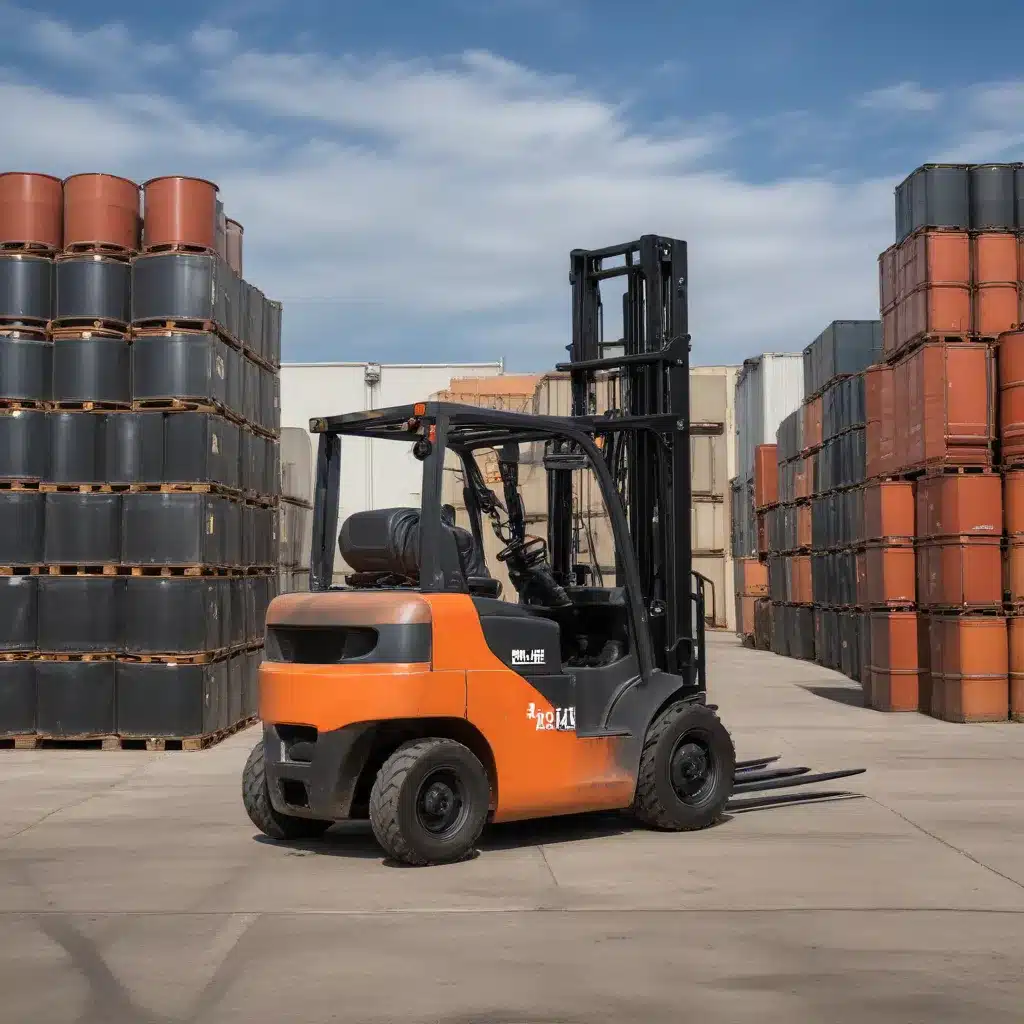
Understanding the Forklift Fuel Landscape
In the fast-paced world of warehouse and logistics operations, forklifts are the backbone of material handling, responsible for the seamless movement of goods and supplies. As businesses strive to optimize their operations, the fuel efficiency of forklift fleets has become a critical consideration. Striking the right balance between performance, cost, and environmental impact is essential for maintaining a competitive edge and upholding sustainable practices.
Exploring Forklift Fuel Types
The forklift industry offers a diverse range of fuel options, each with its own advantages and drawbacks. Electric forklifts, powered by rechargeable batteries, have emerged as a popular eco-friendly choice, producing zero emissions during operation. These silent workhorses not only reduce a warehouse’s carbon footprint but also offer cost savings through lower energy consumption and maintenance requirements. Propane forklifts represent a balanced alternative, providing a cleaner-burning fuel with reduced emissions compared to traditional diesel or gasoline models. While diesel and gasoline forklifts still hold a place in heavy-duty applications, their higher pollution levels have made them less desirable in today’s environmentally-conscious climate.
Evaluating Fuel Efficiency Factors
Forklift fuel efficiency is influenced by a multitude of factors, from the equipment’s design and maintenance to the operating environment and load management practices. Proper load distribution, for example, can have a significant impact on fuel consumption, as unbalanced loads can lead to increased wear and tear on the forklift’s components, resulting in higher energy usage. Likewise, regular servicing and proactive maintenance strategies can help maximize a forklift’s fuel efficiency by ensuring optimal performance and prolonging its lifespan.
Balancing Performance, Cost, and Sustainability
As businesses navigate the forklift fuel landscape, they must carefully weigh the trade-offs between performance, cost, and environmental impact. This delicate balance requires a comprehensive understanding of the various fuel types, their associated benefits and drawbacks, and the implementation of effective management strategies.
Optimizing Forklift Performance
Forklift performance is a critical consideration, as it directly impacts productivity and operational efficiency. Electric forklifts, in particular, have made significant strides in terms of power and runtime, with advancements in battery technology and motor design. Propane forklifts also offer consistent power output throughout their operation, ensuring reliable performance in a wide range of applications. By selecting the appropriate forklift model and fuel type for specific tasks, businesses can optimize their material handling capabilities while minimizing the impact on overall operational efficiency.
Reducing Forklift Fleet Costs
The financial implications of forklift fuel selection cannot be overlooked. While electric forklifts may have a higher upfront cost, their lower operating and maintenance expenses can provide significant long-term cost savings. Propane forklifts also offer a more cost-effective alternative to traditional diesel or gasoline models, with reduced fuel and maintenance requirements. By leveraging data-driven fleet management solutions, such as those offered by Forklift Reviews, businesses can gain deeper insights into their forklift fleet’s performance and identify opportunities for cost optimization.
Prioritizing Environmental Sustainability
As the global push for sustainability gains momentum, businesses are increasingly focused on reducing their environmental impact. Electric forklifts, with their zero-emission operation, stand out as the clear choice for eco-conscious organizations. Propane forklifts, with their lower emissions compared to diesel and gasoline counterparts, also contribute to a more sustainable material handling ecosystem. By embracing these cleaner fuel options, businesses can demonstrate their commitment to environmental responsibility and contribute to a greener future.
Integrating Forklift Fuel Efficiency Strategies
Achieving the optimal balance between performance, cost, and sustainability requires a comprehensive approach to forklift fleet management. This involves the strategic integration of various fuel efficiency strategies, leveraging a combination of technology, best practices, and industry expertise.
Leveraging Data-Driven Insights
Data-driven solutions, such as those provided by Forklift Reviews, offer valuable insights into forklift fleet performance and fuel consumption patterns. By analyzing real-time data, businesses can make informed decisions about equipment selection, load management, and maintenance schedules, ultimately enhancing their forklift fleet’s efficiency and reducing overall operating costs.
Implementing Maintenance Best Practices
Proactive maintenance is a cornerstone of forklift fuel efficiency. Regular servicing, including inspections, component replacements, and software updates, can help maximize equipment performance, extend operational lifespan, and minimize energy consumption. By adhering to manufacturer recommendations and industry best practices, businesses can ensure their forklifts operate at peak efficiency, regardless of the fuel type.
Investing in Fleet Optimization Solutions
Specialized fleet optimization solutions, like those offered by leading industry players, can provide comprehensive support for forklift fleet management. These solutions often integrate advanced technologies, such as load sensors and weight monitoring systems, to assist with load distribution and weight management. By leveraging these innovative tools, businesses can optimize their forklift operations, improve safety, and enhance overall fuel efficiency.
Fostering Operator Training and Awareness
The human element plays a crucial role in forklift fuel efficiency. Comprehensive operator training, covering proper load handling, energy-efficient driving techniques, and maintenance responsibilities, can have a significant impact on a forklift fleet’s performance and environmental impact. By empowering operators with the knowledge and skills to operate forklifts efficiently, businesses can unlock additional fuel savings and extend the lifespan of their equipment.
Embracing the Future of Forklift Fuel Efficiency
As the forklift industry continues to evolve, the pursuit of fuel efficiency will remain a top priority for businesses seeking to optimize their operations, reduce costs, and contribute to a sustainable future. By embracing innovative technologies, implementing best practices, and fostering a culture of efficiency, organizations can navigate the forklift fuel landscape and maximize the benefits for their bottom line, their workforce, and the environment.
To learn more about forklift reviews, safety guidelines, maintenance tips, and industry trends, visit the Forklift Reviews website, where you’ll find a wealth of valuable information and expert insights to guide your forklift fleet management strategies.

